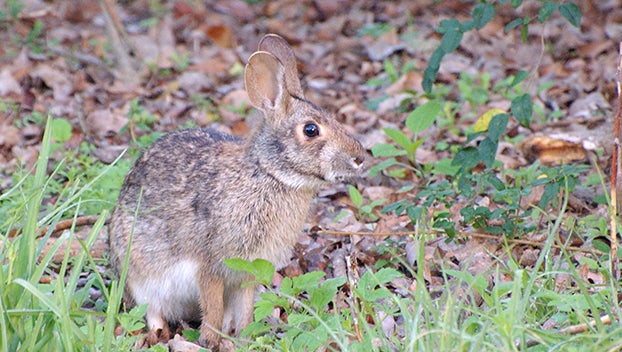No new detections of rabbit disease
Published 1:42 pm Friday, April 21, 2023
STARKVILLE — Spring is here and you might notice an influx of young rabbits and squirrels and naturally roadkill. Small game biologist Rick Hamrick with the Mississippi Department of Wildlife, Fisheries and Parks said there has not been any new detections of Rabbit Hemorrhagic Disease Virus Type 2, or RHDV2, which was first detected in Mississippi in October 2021.
The virus infected about 20 domesticated rabbits in Rankin County but since then no new outbreaks have been detected. Hamrick said updates from the United States Department of Agriculture have slowed down and he had not heard of any more outbreaks out West.
RHDV2 is a novel strain of RHD. Rabbit Hemorrhagic Disease is a disease caused by a virus in the calicivirus family.Until 2018, this disease was only found in European rabbits before it was detected in Canada. By 2020, the disease had spread in the west to New Mexico, Arizona, Colorado, Texas and California. He said it is safe to assume RHDV2 could spread to native species of wild eastern cottontail and swamp rabbits.
According to the MDWFP website, the disease enters a rabbit’s body through the mouth, nose or eyes. The virus persists in the environment for a very long time and is resistant to deactivation.
The virus spreads through direct contact with infected live or dead rabbits. Humans, pets and livestock are not susceptible to the disease. Humans can spread the disease with rabbit fur on their clothing. It could also spread through rabbit urine or feces in the bedding of domesticated rabbits, Hamrick said.
RHD has a mortality rate of 20 percent, on average. In localized settings, the mortality rate ranges from 5 to 70 percent. In this instance, 21 out of 22 rabbits died within a six- to eight-day period. There is a vaccine that was granted emergency authorization, Hamrick said.
“There is still not a cure or treatment once a rabbit is infected. There has been a vaccine granted emergency authorization that can be used to protect domesticated rabbits,” Hamrick said in September. “Medgene Labs based in Brookings, SD received emergency use authorization from the USDA for their RHDV2 vaccine. Rabbit owners would need to contact their veterinarian to determine how it might be obtained and administered, and supplies are likely limited.”
People can call (601) 359-1170 if they have any questions. As of right now, there is no evidence of the disease in wild rabbit populations in Mississippi. It is important to dispose of any road-killed rabbits properly to avoid potential spread of the disease. If you remove the animal from their home range area, it is best to place the remains in a garbage bag so it could be buried in a landfill rather than throwing it out into the woods, he said.
Some of those good sanitation practices and biosecurity include:
- Do not allow pet or wild rabbits to have contact with your rabbits
- Do not allow visitors in rabbitries or let them handle pet rabbits without protective clothing
- Always wash hands with soap and water
- Do not introduce new rabbits from unknown or untrusted sources
- If you bring outside rabbits into your home keep them in quarantine for at least 30 days
- Sanitize all equipment and cages
- Establish a worked relationship with a veterinarian to review biosecurity practices
- If you live near or visit an area where the disease is confirmed do not touch any dead rabbits
- If you see multiple dead rabbits contact the MDWFP
- If you own domesticated rabbits do not release them into the wild
People should contact Rick Hamrick via email at Rick.Hamrick@wfp.ms.gov or the MDWFP at 601-432-2199 if they find large numbers of dead wild rabbits with no apparent signs of death. Those who have domesticated rabbits should contact the MBAH if they notice several domesticated rabbit deaths by calling 1-888-722-3106.
Diseases in other small game
Hamrick said squirrels can get diseases but they don’t seem to suffer from big disease outbreaks like rabbits and birds do. Diseases can also be hard to identify in squirrels.
“There is not a real good idea of what proportion of the population is affected by some of the diseases,” Hamrick said. “There are several diseases and parasites they can get but it doesn’t appear to be impactful at the population level and many are not fatal. Tularemia, bacteria, may be the most serious disease they could have. I don’t hear of it affecting squirrels to the extent it does rabbits.”
Mississippi’s spring season opens on May 15. Hunters can keep an eye out for Tularemia when harvesting game. Small white spots on the liver can be a visible indicator of the disease although not definite. If you do find a squirrel suspected of having Tularemia contact Hamrick or the MDWFP and seal the carcass and organs in a Ziploc bag. Place the bag on ice as soon as possible and disinfect anything used in field dressing the animal.
Botfly larvae are another odditie hunters might encounter with squirrels from August to October. Mississippi’s fall season is set to open in October to avoid the possibility of encounters with Botfly Larvae on squirrels. These larvae do not affect a hunter’s ability to consume the meat.






